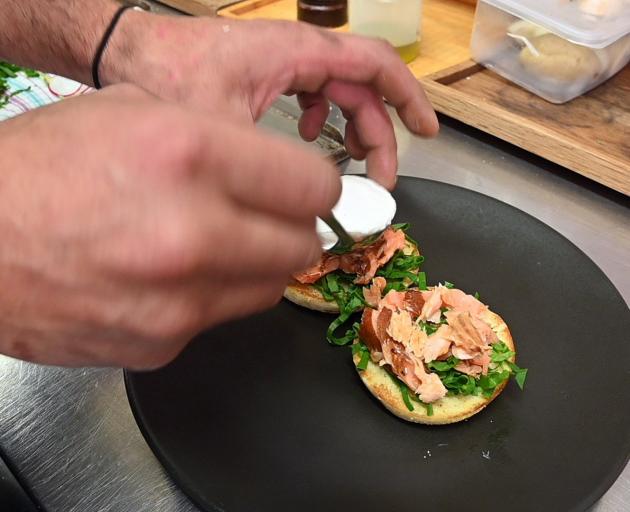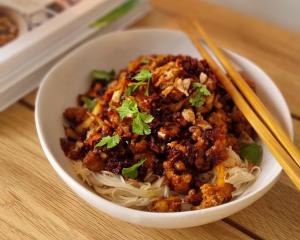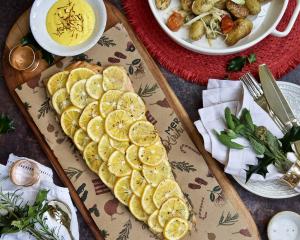Covid-19 forced chef Kane Bambery to take a good hard look at his life. Now back in his home town he is on a mission to reduce waste, support local producers and get fellow chefs talking to each other, he tells Rebecca Fox.
Kane Bambery comes with quite a CV — stints at top New Zealand restaurants Roots at Akaroa and Amisfield and Sherwood in Queenstown are in the mix.
For a Dunedin restaurant he is quite a catch — all made possible by Covid-19 decimating Queenstown’s tourism sector.
Bambery is quite frank about it — if it was not for the pandemic closing restaurants, he would have still been working 80-hour weeks in Queenstown.
"That was what was important and I’d still be doing that if there was no Covid. I’d still be working, grinding away," he said.

"So I took advantage of the Government subsidies and jumped on straight away. It was strange to study at 34 but I loved it. The tutors there were right on my vibe. It was great."
The course reignited a love for fungi and he came down to Dunedin with the idea of possibly finding somewhere to grow mushrooms.
In the process he discovered a different Dunedin from what he remembered growing up in the city.
"I realised how beautiful it was again. I used to come back here and go ‘I need to get out of here’."
He left at age 18 determined to get a career and finding himself in the Hawke’s Bay kitchen of former Bracken owner Ken O’Connell.
"He trained me, made me. He’s a legend."
For the next few years wherever O’Connell went so did Bambery. He then headed south again, doing stints at Hotel St Moritz in Queenstown before moving to Mt Cook’s Hermitage, where he became executive chef.
Europe called and it was at Noma in Denmark, named the Top Restaurant in the World for its groundbreaking reinvention of Nordic food, that Bambery had his defining moment as a chef.
"I was like ‘We could do this in NZ. We don’t need to source food outside New Zealand’."
He came back to New Zealand and set about working towards his goal.
"I saw myself having New Zealand’s first restaurant in the top 50 in world. That was my passion and my drive. Nothing was going to stop me."
If that meant 100-hour weeks then he was going to do it — captivated by Elon Musk’s philosophy that if you work 80-100 hours a week you can retire in half the time.
"That stuck with me; it justified my working. I knew it was stupid to be working like that but if you want to get somewhere you have to do hard yards."
For a couple of years he worked at Roots in Lyttelton, which won Best Restaurant in the 2015 Cuisine Good Food Awards and was consistently recognised with a maximum three-hat rating from the food magazine.
It was there he learned about foraging from skilled forager Peter Langlands.
He moved to Arrowtown, where he worked at Amisfield under top New Zealand chef Vaughan Mabee and then Sherwood in Queenstown.
It was there "everything clarified" that it was not all about working long hours and it reignited his love of growing food.
"I had a great team around me and could just focus on doing my job."
He also learnt if he had the best ingredients in the world to work with then his job was "easy".
"So we started focusing on the garden.
"If you focus solely on produce you can taste it."
That love goes all the way back to spending time with his grandmother in Waikouaiti, who would trade vegetables for wool and make preserves to trade for honey.
"They were the good old days. I came back and realised I loved doing that as a kid."
Also realising Dunedin today was quite a cool city with great eateries, he decided to apply for the chef’s job at Nova in the Octagon after seeing an advertisement.
"I guess I’m older, I have an appreciation for the coast, nature’s just there, the hills, all the growers around us willing to do good things."
An added bonus was being able to reconnect with family in the city and living beside the sea. Although it did mean making the tough decision for his family to stay in Arrowtown, where his 7-year-old daughter is settled in school.
"It was time to come home and knuckle down."
For Bambery that has meant putting some of his philosophies into practice at Nova.
While having a restaurant garden is not possible in the central city, he is instead seeking out as many local producers as he can and concentrating on making the restaurant more sustainable.
Ask Bambery what is important to him about the produce he uses and he answers simply: "Quality and its footprint. Footprint is massive to me’.
The No 1 goal is reducing the restaurant’s waste so nothing goes to landfill. He has learnt to narrow down what he wants to achieve.
"I’m the sort of person who’ll pick 300 things and get nothing done. I wanted it done straight away and wanted it done by March, but no, I have learnt to slow down as there is so much to do."

"These guys, Mark, is inspiring. He gets an idea and goes with it."
Bambery does his best to use all parts of the animal and plant in his cooking, then what can be composted is taken to the farm, leaving only what remains for the landfill.
"Hundreds and hundreds of kilograms of food waste have been collected already."
He has set up a bin system in the kitchen educating the chefs and front-of-house staff in what can be put in what bin.
"The savings to business is in the thousands of dollars and that can be put into educating staff.
"I know I’m in right place here and they will develop staff."
Suppliers are urged to provide produce in compostable, recyclable or reusable containers where possible and every week they try to preserve or pickle something — recently they made 5kg of coriander pesto to get them through winter.
"We keep ticking things off. There are positives happening. We’ve got recycling down to one bin every two weeks."
Bambury also enjoys working directly with those who grow or produce food locally.
"Having people come in and talk to you rather than just a box dropped on the back doorstep. It’s very important having story behind produce."
The vegetable growers in the area are exceptional and keen to grow what Nova needs, he says.
This is just one aspect where having the city’s chefs work together could benefit everyone as it reduces costs and backs local businesses, Bambery believes.
"If there is the demand there from chefs, they’ll grow it."
At the moment it is more costly to buy these quality products but the restaurant does not seek to pass those costs on to the customer.
"You pay for quality. But it’s about the utilisation of the plants — how smart we are using it."
It also means being more flexible with their menus to respond to what is available, something Nova is keen to do.
"We’re working on that for next year, switching in and out as needed, and here the owners are more than willing to try."
He also hopes to hold regular get-togethers of the city’s chefs and front-of-house staff to talk about the issues they face, share resources and work together to make Dunedin a real dining destination.
"It’s not about stealing off each other, it’s about working together."
Ultimately, Bambery has dreams of running a restaurant with a cooking school and garden attached to educate people about growing and cooking.
He is a big fan of British chef Jamie Oliver’s endeavours to take troubled youngsters and turn them into chefs.
"The kitchen can teach you a lot — timing, teamwork, respect."
 Ora king salmon flatbread with pickled onion, chive mascarpone, crisp kale, herb pesto, dukkha and local greens
Ora king salmon flatbread with pickled onion, chive mascarpone, crisp kale, herb pesto, dukkha and local greens

Flatbread
350g self-raising flour, plus extra for dusting
1 tsp baking powder
350g natural yoghurt
Chive mascarpone
150g Chives
500g Mascarpone
4 Tbsp milk
salt
pepper
1 lemon
Pickled onion
200g of red onion
500ml water
50ml house vinegar
50g salt
50g sugar
Crisp kale
a quantity of kale
Herb pesto
1 cup packed fresh flat-leafed parsley
leaves, washed well and spun dry
½ cup packed fresh basil leaves, washed well and spun dry
1 Tbsp fresh thyme leaves
1 Tbsp fresh rosemary leaves
1 Tbsp fresh tarragon leaves
½ cup freshly grated parmesan
⅓ cup olive oil
¼ cups walnuts, toasted golden brown and cooled
1 Tbsp balsamic vinegar
Dukkha
¼ cup raw pistachios
¼ cup raw cashews
¼ cup blanched almonds
¼ cup blanched hazelnuts
¼ cup coriander seeds
¼ cup unsweetened shredded coconut
1½ Tbsp cumin seeds
¼ cup sesame seeds
¼ tsp kosher salt
⅛ tsp freshly ground pepper
Salmon
2-3kg salmon (pin boned and skinned)
birch for basting
Brine
700ml cool water
⅓ cup kosher salt
1 cup brown sugar

Flatbread
Add all the flatbread ingredients to a mixing bowl and mix together with a spoon, then use clean hands to pat and bring everything together.
Dust a clean work surface with flour, then tip out the dough.
Knead for a minute or so to bring it all together (this isn’t a traditional bread recipe, so you don’t need to knead it for long — just enough time to bring everything together).
Put the dough in a floured-dusted bowl and cover with a plate, then put aside.
Chive mascarpone
Whip the mascarpone with milk to give air, add the rest of the ingredients and fold together.
Pickled onion
Boil all ingredients except onions, dissolving sugar and salt. Pour over onions, rest.
Crisp kale
Fry kale at 140degC until crisp, then put in a dehydrator to extract the remaining oil.
Herb pesto
Place all ingredients in a food processor and blend together until smooth. Add salt and pepper to taste.
Dukkha
Heat the oven to 180degC. Spread the nuts on a baking sheet and toast for about 8 minutes, until golden.
Coarsely chop the nuts. Toast the coriander seeds over moderate heat until fragrant, about 2 minutes. Transfer to a food processor and pulse until chopped. In the skillet, toast the unsweetened shredded coconut and cumin seeds, stirring, until the coconut is golden, 2 minutes; add to the food processor along with the chopped nuts and pulse until coarsely ground. Transfer the dukka to a bowl.
In the skillet, toast the sesame seeds until golden, 4 minutes. Stir the sesame seeds into the dukka, season with the salt and pepper.
Salmon
1. Mix together the brine ingredients and place your fish in a non-reactive container (plastic or glass), cover and put in the refrigerator. This curing process eliminates some of the moisture from the inside of the fish while at the same time infusing it with salt, which will help preserve the salmon.
2. You will need to cure your salmon for 18-26 hours in the brine. Never go more than 48 hours, however, or your fish will be too salty. Double the brine if it's not enough to cover the fish.
3. Take your fish out of the brine and pat dry. Set the fillets on your cooling rack, skin side down. Ideally you'd do this right under a ceiling fan set on high, or outside in a cool, breezy place. Let the fish dry for 2 to 4 hours (or overnight in the fridge). You want the surface of the fish to develop a shiny skin called a pellicle.
4. This is one step many beginning smokers fail to do, but drying your cured, brined fish in a cool, breezy place is vital to properly smoking it. The pellicle seals it and offers a sticky surface for the smoke to adhere to. Don't worry, the salt in the brine will protect your fish from spoilage. Once you have your pellicle, you can refrigerate your fish for a few hours and smoke it later if you'd like.
5. Start with a small fire and work your way up as you go. It is important to bring the temperature up gradually or you will get that white albumin "bleed" on the meat.
6. After 30-45 minutes in the smoker, baste the fish with birch syrup. This is a good way to brush away any albumin that might form. In most cases, you will get a little. You just don't want a ton of it.
7. You must be careful about your heat. Other than failing to dry your salmon long enough, the single biggest problem in smoking salmon is too must heat. If you've ever seen salmon "bleed" a white, creamy substance, that's a protein called albumin. If you see lots of it, you've screwed up; a little is normal.
8. Here's what happens: If you cook a piece of salmon at too high a heat, the muscle fibers in the meat contract so violently that they extrude albumin, which immediately congeals on the surface of the fish. It's ugly, and it also means your salmon will be drier than it could have been. You prevent this with a solidly formed pellicle, and by keeping your heat gentle.
9. Once your fish is smoked, let it rest on the cooling rack for an 15 minutes before you put it in the fridge.












